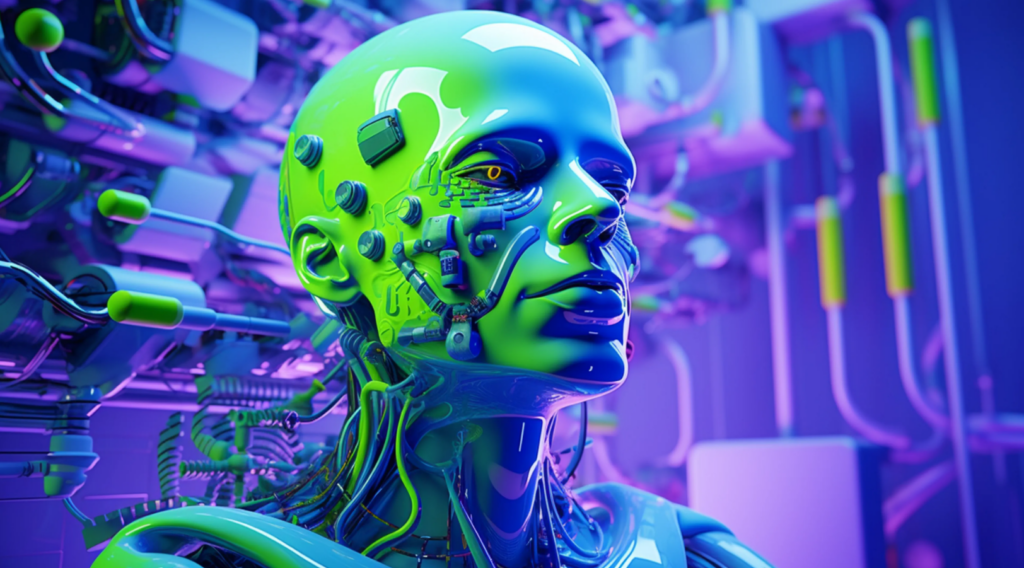Have you wondered what artificial intelligence is for? You've probably heard this term for several months now, especially with the advent of brands like ChatGPT, MidJourney, and more Generative Artificial Intelligence tools. (GenAI). Well, at Codster we are here to help you understand these types of new technologies so that you can get the most out of them for you and your company.
Let's start with the basics, artificial intelligence (AI) represents a fundamental tool with transformative potential in our lives, work and entertainment. Its effectiveness lies in the automation of business tasks, such as customer service, lead generation, fraud detection and quality control, replacing human tasks, especially in repetitive and detailed activities.
This is evident in the ability of this tool to analyze extensive legal documents and ensure the correct completion of relevant fields, executing tasks quickly and with minimal errors.. Additionally, with its ability to process large data sets, AI provides businesses with insights into their operations that may have previously gone unnoticed. The growing range of generative AI tools is crucial in fields ranging from education and marketing to product design.
Advances in Artificial Intelligence development have not only increased efficiency, but have also opened new business opportunities for large companies. Before the current wave that we are currently experiencing, as pointed out CISCO in its 2023 report, many Latin American companies are thinking about investing or developing services with this type of technology.
In fact, it would now be difficult to imagine the connection between passengers and taxis without computer software that makes it possible to speed up journeys, connect customers and more. For example, Uber has become a Fortune 500 company through this innovation.
Today, AI has become an essential element for many of the most successful companies, such as Alphabet, Apple, Microsoft and Meta. These companies use AI technologies to improve their operations and outperform the competition. For example in Google, a subsidiary of Alphabet, this tool is key in its search engine, in Waymo's self-driving cars and in Google Brain, creator of the transformer neural network architecture that has driven recent advances in natural language processing.
How does artificial intelligence help us in everyday life?
Now, what is Artificial Intelligence used for in everyday life? At Codster, we explain how, in addition to their uses for large technology industries, these types of tools have also found a place in our daily lives. From small things like online shopping to making our jobs easier.
AI is divided into two categories: weak (narrow) and strong (general) AI. Weak AI specializes in specific tasks, such as industrial robots and virtual personal assistants, while strong AI seeks to replicate the cognitive abilities of the human brain and solve unknown tasks autonomously.
Furthermore, it is classified into four types, from reactive machines to conscious systems, with different levels of learning capacity and social understanding, with self-awareness being the most advanced level that has not yet been achieved in AI.

Below, we list some applications of artificial intelligence that may go unnoticed in our daily lives and that will surely help us understand the level of penetration it has had in our lives:
Online shopping and advertising
AI is widely used to offer personalized recommendations based on previous searches, previous purchases, and other online behaviors. In commerce, AI optimizes products, plans inventories and manages logistics.
- Web search
- Search engines learn from the enormous amount of user data to deliver relevant and accurate results.
- This allows the options that each of them recommends to you to be more personalized and ideal for your life.
- Digital personal assistants
- Smartphones use AI to provide personalized services through virtual assistants that answer questions, offer suggestions and help organize daily routines.
- For example, Amazon's Alexa usually listens to your conversations to know what type of products to recommend to you.
- Machine translations
- Translation software, whether written or oral, relies on AI to provide and improve translations, including automatic subtitling.
- What Artificial Intelligence is currently used for is to offer translations in real time using the microphones of mobile devices.
- Smart homes, cities and infrastructure
- Smart thermostats learn behavior patterns to save energy.
- Smart cities seek to improve connectivity and reduce traffic congestion. Applications like Waze or Uber are examples of this type of tools.
- Automobiles
- Although autonomous vehicles are not common, cars already use AI-based safety features.
- For example, EU-funded automated sensors detect potential dangers and accidents.
- cybersecurity
- AI systems recognize and combat cyberattacks based on continuous data, identifying patterns and tracking attacks.
- For example, Amazon seeks to predict possible cyberattacks from hackers through this type of technology.
- Artificial intelligence against Covid-19
- AI has been used in thermal imaging, medicine and disease monitoring to detect infections and track the spread of Covid-19.
- Fight against misinformation
- Some AI applications can detect fake news on social media, identifying alarming words and reliable sources.
- Artificial Intelligence is used to recognize articles, images and videos created by other AIs to misinform the general public.
According to the European parliament, there are other options and industries that Artificial Intelligence serves. These include very varied branches such as Health, Transportation and even public and administration services. Some of them are the following:
- Health
- Researchers use AI to analyze large amounts of data and improve medical diagnoses.
- Artificial Intelligence is also used to generate disease spread patterns and calculate the expense this entails.
- Transport
- AI could improve the safety and efficiency of rail traffic.
- Likewise, it makes the public transport journey more efficient to improve people's quality of life.
- Manufacture
- AI helps manufacturers be more efficient and plan for maintenance in smart factories.
- These types of tools detect machine wear and prevent possible technical errors.
- Food and agriculture
- AI contributes to sustainable food systems, improving productivity and reducing environmental impact.
- Administration and public services
- AI could provide early warning of natural disasters and facilitate preparation and mitigation of consequences.
- The same way, there are cases in which Artificial Intelligence serves to analyze the fiscal situation of users and how they could face difficulties when using credit.
Advantages and disadvantages of Artificial Intelligence:
Now, as CISCO points out, there are many disadvantages when implementing Artificial Intelligence within technology industries, since several of them are not prepared to make this transition of processes and tools.
Therefore, it is necessary to know its advantages and disadvantages:
- Advantage
- Excellence in detailed tasks, even outperforming doctors in specific cancer diagnoses.
- Reduction of time in analyzing large data sets in industries such as banking, pharmaceuticals and insurance.
- Increased productivity and labor savings, for example, through automation in warehouses.
- Delivering consistent results, such as accurate translation to reach customers in their native language.
- Ability to improve customer satisfaction through personalization of content and services.
- Constant availability of AI-powered virtual agents for 24/7 uninterrupted service.
- Disadvantages
- High costs.
- Need for deep technical knowledge.
- Shortage of qualified workers to build AI tools.
- Reflecting biases from large-scale training data.
- Lack of ability to generalize from one task to another.
- Increase in unemployment due to the elimination of human jobs.
Each of these points may vary according to each industry and company. Remember that depending on your business, it may be affected to a greater or lesser extent or have negative repercussions due to the development of the technological environment.
If you have even more questions, do not hesitate to request a consultation with Codster to learn more about the benefits and what Artificial Intelligence is for. Well, many of them depend on the specifications and needs that your own firm has. But, don't worry, we will surely find the perfect and ideal solution for you.






